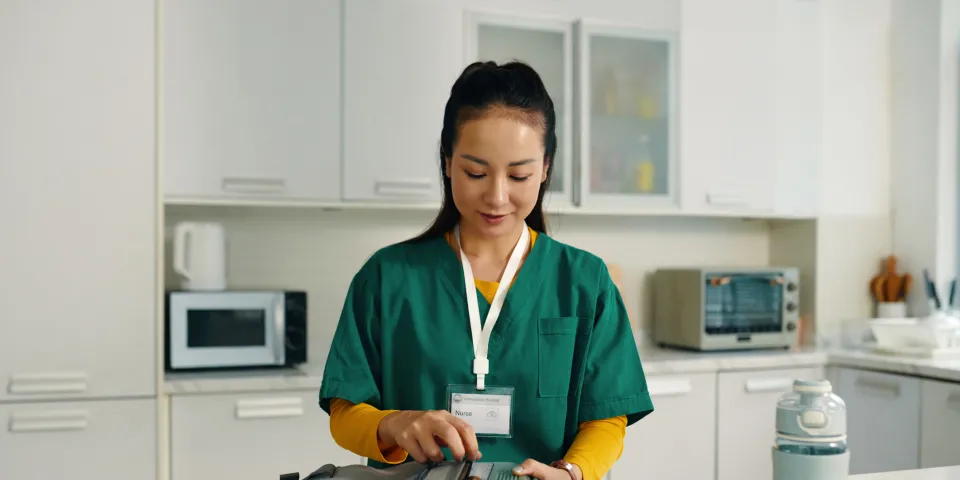Latest
What Every Nurse Needs for Clinicals
Dec 23, 2024

As a nursing student, you probably are itching to apply what you learned in the classroom. Clinicals are our opportunity to bring your knowledge and skills to real-life situations. During your clinical rotation, you work with real patients at a hospital, clinic or other medical facility under the supervision of licensed nurses.
While you may feel mentally prepared to take on this exciting new challenge, you may wonder what you need to bring with you for your clinical rotation. To help you feel prepared and start the year off on the right foot, try to assemble as many of your nursing student supplies beforehand.
Clothing
· Scrubs
As you might imagine, the first item on any to-be nursing student shopping list should be nursing scrubs. Sometimes your college or university will provide you with a branded uniform, or your clinical placement may have specific colors they want you to wear. Make sure you know what kind of scrubs are required before investing in a complete uniform.
Once you know what the requirements are, you can start looking for a quality uniform. One tip is to find scrubs that have large pockets. You will quickly discover how indispensable pockets are for nurses to hold nursing supplies!
· Compression Socks
Compression socks may not be a fashion statement, but I promise that your feet will thank you at the end of the day. Compression socks encourage healthy blood flow and discourage blood from pooling in your feet. This helps reduce your risk of developing blood clots and helps combat the pain and fatigue that can result from being on your feet all day.
· Shoes
Along the same lines as compression socks, having a good pair of shoes can make all the difference. Not all shoes are created equal. Your organization may have specific rules for shoes but otherwise, wear non-skid bottoms, that are completely closed to protect you from spills and sharp items. Arch support is key as it can help prevent many musculoskeletal problems that could lead to back problems and even disability.
· Watch
A good water-resistant watch with a second hand to check your patient’s pulse and respiratory rate. Most hospital rooms will have a clock, but you never know if they will be accessible or if they are working. Regardless of availability, it’s more convenient to always have a watch on your wrist.
Supplies
· Scissors
You never know what medical materials you might have to cut as a nurse: tape, dressings, bandages, gauze and more. Sure, you could try to strongarm a piece of tape, but it is so much easier having a small pair of scissors in your pocket or on your lanyard for easy access.
· Pen and Paper
In the 21st century, something as old and antiquated as a pen and paper seems almost counterintuitive. Having a pen and paper on hand for notes, vital signs and assessments can make all the difference. Pens are also helpful for making notes and dressing changes. A pro nursing tip is to only pack clicky pens. Pen caps have the ability to magically disappear and leave stains on the inside of your pocket so having a pen that opens and closes by itself is a step above others.
· Pen Light
It may look like a pen, but a penlight is so much more than that. The powerful little flashlight can be used to assess a patient’s pupil reactivity, mouth, ears, nose, throat and wounds. Given its compact size, it is much more convenient than using your phone flashlight or a standard store bought flashlight.
As you gear up for your clinical experience, remember that preparation is the key to success. Packing the right tools, supplies, and mindset will not only help you navigate your day with confidence but also enhance your learning opportunities. Clinicals are more than just a step in your education—they’re your chance to grow, adapt, and shine as the amazing nurse you’re becoming. So, double-check your bag, lace up those comfortable shoes, and step into your clinical rotation ready to make an impact!
Learn More About Our Nursing Programs
Bureau of Labor Statistics (BLS), U.S. Department of Labor, Occupational Employment and Wage Statistics 2023 / Occupational Outlook Handbook 2022. BLS estimates do not represent entry-level wages and/or salaries. Multiple factors, including prior experience, age, geography market in which you want to work and degree field, will affect career outcomes and earnings. Herzing neither represents that its graduates will earn the average salaries calculated by BLS for a particular job nor guarantees that graduation from its program will result in a job, promotion, salary increase or other career growth.
Latest
Recent Blog Posts
Subscribe to our Newsletter
Get the latest news you need to know, from study hacks to interview tips to career advancement. Have it delivered right to your inbox biweekly.








